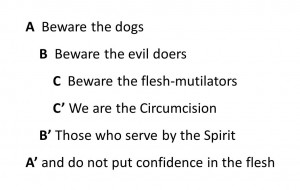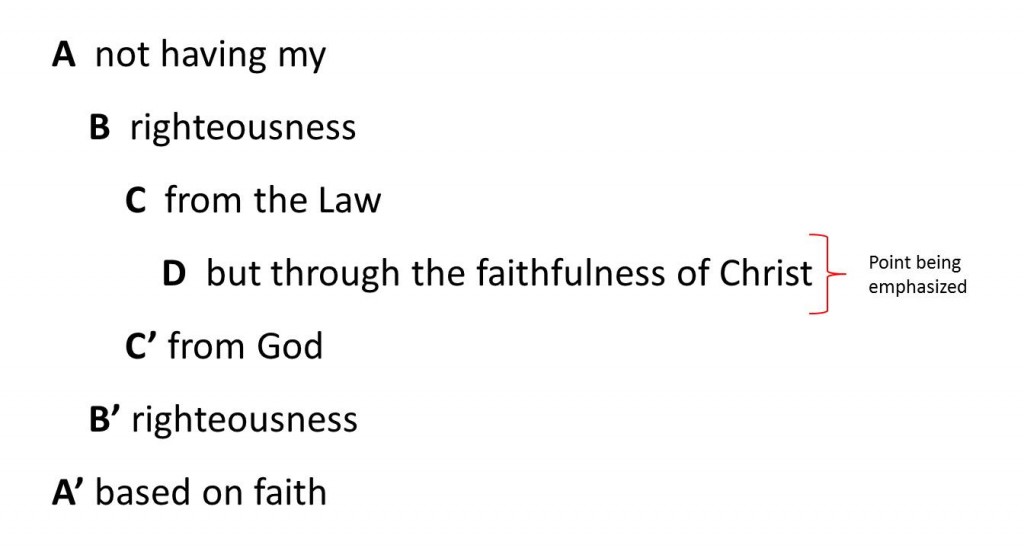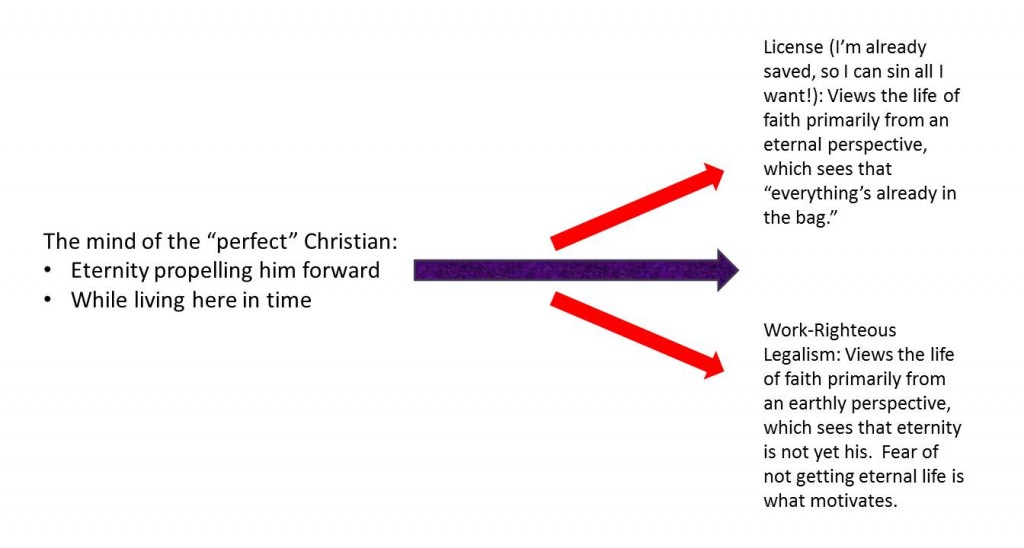 With Paul having finished discussing his desired plans for Timothy and Epaphroditus, he now tells the Philippian Christians to rejoice. He does not want to let those who would try to place them under the yoke of the Law to have their way.
With Paul having finished discussing his desired plans for Timothy and Epaphroditus, he now tells the Philippian Christians to rejoice. He does not want to let those who would try to place them under the yoke of the Law to have their way.
Warnings against Judaizers
Read Philippians 3:1-2
– What does Paul first say to do?
– It follows then that to get caught up in what he next warns of will do what to their rejoicing?
– Who were these mutilators of the flesh?
Excursus: Mutilators of the Flesh
That expression referred to “the Judaizers.” They were a subset of ethnically Jewish Christians in the early Church. They demanded circumcision and adhering to the ancestral traditions of the Old Covenant as necessary for salvation (Acts 15:1-5). In other words, they lived out their faith as if Christ did not fully fulfill the New Covenant!
Requiring circumcision for salvation stands in stark contrast to the freedom of faith in Jesus Christ (Matthew 11:29-30), who alone frees us from sin and death (Acts 13:38-39). For Paul, the two were mutually exclusive. That’s because accepting the yoke of the Law as a requirement for salvation was to reject Christ as the sole foundation of our redemption and spiritual life (Galatians 2:21).
————–
Read Philippians 3:3
– What does Paul say about who Christians are?
– Paul says that Christians are the “true circumcision.” What then does that say about the completeness of circumcision that took place in the Old Covenant, even when such circumcisions were done according to God’s command?
– How do Christians worship?
Excursus: True Circumcision
Physical circumcision was the sign of the covenant that God made with Abraham (Genesis 17:9-14) and the rite of initiation into the family of Israel (Leviticus 12:3). However, the Old Testament also teaches that circumcision of the body pointed to a deeper need to circumcise the heart by consecrating it to God and cutting away its rebellious inclinations (Leviticus 26:41; Deuteronomy 10:16).
In the New Covenant, God circumcises the hearts of believers in Baptism (Colossians 2:11-12). Colossians 2:11-12 reads:
You were also circumcised by him [that is, Jesus Christ]. This, however, was not a circumcision performed by human hands; instead, it was a removal of the corrupt nature in the circumcision performed by Christ. This happened when you were buried with him in baptism, in which you were also raised with him through faith in the working of God, who raised him from the dead.
God promised to Moses that He would make physical circumcision unnecessary in the time of restoration (Deuteronomy 30:6). As a result, the spiritual work that God does through the word and water of baptism makes physical circumcision unneeded and outdated in the New Covenant (1 Corinthians 7:19 and Galatians 6:15).
————-
In verses 2-3, Paul gets creative by combining antithetic parallelism and a chiasm. Antithetic parallelism makes a  contrast, showing how something is different from that which preceded it. However, Paul does this in a chiastic fashion.
contrast, showing how something is different from that which preceded it. However, Paul does this in a chiastic fashion.
Thus, by use of such a rhetorical device, Paul was saying:
- Christians, unlike what the “dogs” taught, do not put their trust in the flesh: Circumcision, works of the Law, etc.
- Christians, instead of doing evil, serve by the Spirit.
- Christians, instead of relying on the circumcision of the Old Covenant, which Christ fulfilled, are the true Circumcision. Christians have circumcised hearts through the fulfillment of circumcision: baptism.
Read Philippians 3:4-6
– Does Paul start out contradicting himself with what he had just said earlier?
– If not, what was his point?
Read Philippians 3:7-11
“Counted as Loss”: Paul makes a strong connection in verse 7. The verb for “counted” is the same verb that he used earlier for the Christian mind-set (“count others more significant than yourselves,” 2:3). This mind-set imitates the mind-set of Christ, who “did not count equality with God as something to exploit” (2:6).
Now, in Philippians 3:7-8, Paul uses this same word three more times to show how, by the grace of God, he has come to that same new way of seeing, the same mind-set, in his own life. Because of that, despite how much Paul had earlier prized his Jewish credentials, he now considers them even to be “feces” (skubalon) because of the grace he experienced in the risen Christ.
– If the “works” of Paul were not his righteousness, then what was? (vs. 9)
– What individually applies to us the righteousness that God has? (vs. 9)
Excursus: “Faith in Christ” or “the Faithfulness of Christ”
In Philippians 3:9, and elsewhere, scholars have debated whether the Greek phrase pistis Christou should be translated as “faith in Christ” or “the faithfulness of Christ.” The phrase in Greek is ambiguous enough to have either meaning (but not both at the same time unless “word play” is going on). And so we cannot solve this question grammatically.
Thus, we have to turn to context for the proper meaning. So, what is the context? Earlier, Paul had told the Philippian Christians to have the mind of Christ. Then, Paul highlighted just how faithful Christ was in chapter 2, where Jesus humbled Himself for our salvation, etc.
In the immediate context of this verse, Paul contrasts the righteousness that he has against the righteousness that God has.
At the end of verse 9, Paul says that the Christian has God’s righteousness “based on faith.” This statement would be unneeded if he had just said that such righteousness was the Christian’s “through faith in Christ.”
And so we see that “the faithfulness of Christ” better matches the contrast Paul is making, which also happens to prevent unneeded repetition.
———-
Within verse 9, Paul again uses antithetic parallelism and a chiastic structure to emphasize and stress the centrality of what Christ has done for our salvation. However, you can’t really get this from our English translations because a translation following the Greek structure too closely would be disjointed and hard to understand.
– A believer’s faith in Christ connects him to whom? (vs. 10)
– And because of that, what do we receive that is His? (vs. 10-11)
Pursuing the Resurrection of the Body
Read Philippians 3:12
– What has Paul not yet obtained?
– What does He do to make it his own?
– Yet, even before that, who made Paul His own?
– Discuss: the relationship between faith and works.
Read Philippians 3:13-14
– When Paul says that He is forgetting what lies behind, what is he specifically referring to?
– To what does Paul compare the Christian life?
Paul compares the Christian’s life of faith to a race, where the prize of salvation on the Last Day has yet to be won, for the competition is still in progress. Just as challenging the body is part of winning a race, so also does Paul challenge believers to exert effort to live out the life of faith. After all, the stakes of the Christian life are far higher than any sporting event: To be disqualified (1 Corinthians 9:27) from this race is to lose what awaits the Christian on the Last Day (2 Timothy 4:6-8).
Read Philippians 3:15-16
Excursus: The Now and Not Yet of Salvation
Our translations do not allow a deeper meditation what Paul says in verse 16. Perhaps, the translators thought that readers would think that Paul was contradicting himself. In verse 12, Paul wrote: “Not that I have already obtained this [eternity with God on the Last Day] or am already perfect [noun: teleioo]…”
In verse 12, Paul was speaking from the “not-yet” perspective of salvation. He is saved and yet the fullness of salvation is not yet his. That will take place on the Last Day. That is the perspective a Christian has here in time.
In verse 16, Paul, translated to allow his connection to verse 12, says: “Let those of us who are perfect [adjective: teleios] think this way.” Here, Paul was speaking from the “now” perspective of salvation. For those who are saved, everything is already theirs. That is the perspective of the Christian from eternity: He is perfect!
The point Paul is making becomes most real when he says that someone who “gets” it presses on toward the goal that awaits him. The “perfect” Christian is one has an eternal perspective yet lives here in time striving all the more for what awaits him. But what propels the Christian forward is not a “works righteousness” but a pull from eternity that is so strong that he can do no other.
Paul’s “perfect” in verse 16 connects back to the “perfect” in verse 12, showing that the Christian presses on to make eternity his own, because Christ Jesus has made him His own. It’s both “now” and “not yet.” This understanding prevents license (choosing to sin because one is saved) and works-righteous legalism (I strive to “save” myself).



